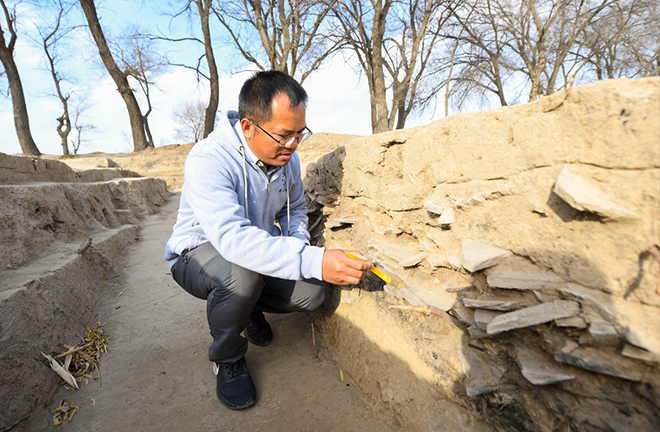Scholars call for archaeology with Chinese characteristics

An archaeologist works at an elevated deck believed to be the foundations of a barn dating back 2,000 years in north China's Inner Mongolia Autonomous Region, Nov. 1, 2020. Photo: Peng Yuan/XINHUA
Xi Jinping, general secretary of the Communist Party of China (CPC) Central Committee, has stressed developing archaeology to better understand the long-standing and profound Chinese civilization.
Chinese civilization is the only civilization in human history that has been uninterrupted for thousands of years, said Feng Shi, a Member of the Chinese Academy of Social Sciences. This long history has created an extensive and profound Chinese culture. The true value of archaeology is that it is the only channel to reveal China's ancestral history in an era that predates documents. Defining civilization, and the Chinese civilization, is the foundation of Chinese archaeology and Chinese cultural studies. Our ancestors' unique epistemology and world outlooks play a critical part in forming both traditional Chinese civilization and traditional Chinese cultures. Thus using theory to clarify these issues is crucial to understanding Chinese civilization.
Huo Wei, a professor from the School of History and Culture at Sichuan University, said that although national-level archaeological projects have been supported by various modern scientific and technological means since the 1980s, the ultimate goal of archaeology remains unchanged—to fully observe the archaeological genealogy and features of historical development in various parts of China, achieve mutual confirmation with the documentation system, and construct an archaeological theory that accurately exhibits the formation of the unified multi-ethnic Chinese nation.
Chinese archaeology is mutually corroborated by abundant unearthed materials and historical documents handed down from ancient times. Together they demonstrate the Chinese nation's progression through the Stone Age, Bronze Age, and Iron Age, as well as the extraordinary process, laws of development, and multi-faceted achievements from primitive societies through early regional states and on to the appearance of a unified centralized state, said He Yun’ao, a professor from the School of History at Nanjing University.
Chinese archaeology is also facing urgent problems, He Yun'ao added. The scale of archaeological institutions and archaeological teams can't meet the actual needs of this country, with its abundant cultural heritage. In this regard, overall planning should be formulated as soon as possible to establish a professional archaeological institution in every multi-district city and in every national historic and culturally significant city. These institutions will be responsible for local cities' archaeological work, including preserving sites in places where infrastructure is being developed.
In the field of historiography, especially archaeology, research materials and research findings display strong national or regional features, noted Wu Xianzhu, a professor from the History and Social Work College at Chongqing Normal University. We should prioritize domestic archaeological materials and conduct comprehensive and in-depth research, producing scientific archaeological results in line with actual situations.
Feng pointed out that the Chinese school of archaeology must be rooted in its own culture, and refine the basic theories of Chinese civilization through studying traditional historical materials, instead of copying Western theories and applying them to Chinese problems. This makes the theoretical construction of Chinese archaeology a priority. When exploring the origins of civilization, we should realize that the civilization developed by the Chinese ancestors is first of all a human civilization. If we ignore human systems of knowledge, moral thoughts, and ritual systems, we will miss the traditional Chinese civilization.
Given that the ultimate goal of archaeology is to uncover historical mysteries, the historical perspective of archaeology becomes a distinctive feature of the Chinese school. Modern China has come from historical China. A true and reliable history is a fundamental guarantee not only for shaping a solid national consciousness, but also for building cultural self-confidence and national self-confidence, Feng continued.
China's abundant archaeological resources may provide the world's best conditions for deepening the archaeological discipline, Wu said. We need to thoroughly explore and study the cultural inheritance and development laws of Chinese history from the Paleolithic period onwards, and organize and publish materials regarding archaeological fieldwork in a timely way.
In addition, we should pay special attention to scientific and technological advancements in archaeology and comprehensive multi-disciplinary research. Cutting-edge archaeological science and technology can help construct the connotations of the discipline of archaeology in China and occupy a vanguard in the international academic community, Wu concluded.
Edited by YANG LANLAN
